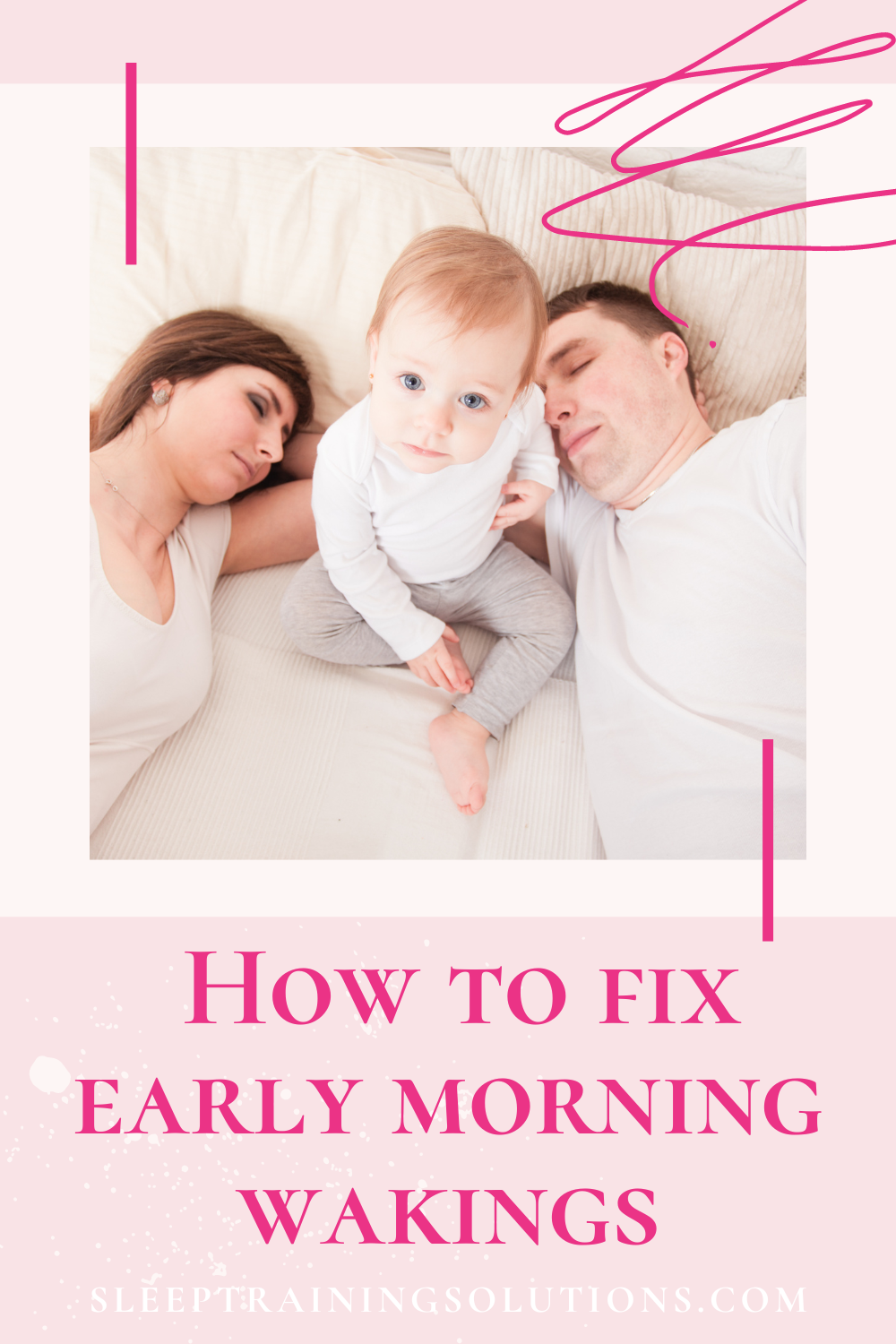How to Fix Early Morning Wakings for Your Baby
Early wakeups and how to stop them
Are you tired of kick-starting your day before the sun even peeks over the horizon, thanks to your little early riser? I feel you, trust me. Having to wake up before you're ready stinks - it’s no fun stumbling through the day in a groggy haze, looking for your next cup of coffee, counting the minutes until bedtime. But don’t worry - I'm here to help bring some much-needed sleep back to your early mornings. Here are some practical tips that will help you conquer your child’s early wake-ups and reclaim those precious hours of sleep.
What is Your Child’s Mood When She Wakes Up Early?
If your child is waking up early, all smiley and ready to start the day, one or more of these could be true:
Bedtime is too early - your child is getting the right amount of sleep but with the current bedtime, your child is done sleeping in that early morning hour
The nap schedule and/or awake time needs to change - your child may be getting too much day time sleep
It’s become a habit - this is the trickiest one to fix because you need to be really consistent to reverse it and change your child’s body clock for a later wakeup time
If your child is waking up still tired and/or cranky, one or more of these could be true:
Bedtime is too late - your child may be overtired from going to bed too late
Your child is waking up hungry - especially if your child is exclusively breastfeed (which is, by the way, 100% doable and encouraged during sleep training!), it’s important that the last feed of the night is a full feed and you’re keeping baby 100% awake and alert during the feed, otherwise she’ll wake up in those light sleep, early morning hours looking for a quick feed to make her drowsy to get an extra hour or two of sleep! Some babies will night wean between 4-6 months but by 6 months, most babies will be able to sleep 11-12 hours overnight continuously.
Your child is looking for help to get back to sleep - just as I mentioned, whatever way your child is being put to sleep for bed will be what she’s looking for each time she wakes up. So if you feed to sleep/drowsy or pop a pacifier in with each wakeup, your child is looking for you to recreate how she originally fell asleep for those 4-6am wakeups.
Teething or not feeling well - you’ll know if it’s this one because it only last a few days. If you have 2 weeks of early wakeups, you can be almost certain it isn’t teething! It could be a food sensitivity, ear infection, etc - best to check in with your pediatrician if your baby just hasn’t been herself for more than a day or two.
Understanding the Early Morning Wake-Up Call
There are a multitude of factors that affect early morning wakings and we’ll cover a few of them in this post, including an inconsistent bedtime routine, how well your baby can fall asleep without “help”, the sleep environment, hunger (or dirty diapers!), and sleep schedule.
Establish a Solid Sleep Routine to Help Early Morning Wakings
Picture this: a magical routine that signals to your baby's sleepy brain that it's time to wind down and catch some Z's. From bathtime giggles to snuggly bedtime stories, you create a comforting and predictable routine that sets the stage for a peaceful night's sleep.
But why would the bedtime routine at night have anything to do with early wakings in the morning?
If your little one’s getting drowsy (or falling asleep) during the bedtime routine, then I can almost guarantee you’ll continue to have early morning wakings (night wakings too!) If that’s happening, that needs to stop. Permanently…not occasionally ;) This is key. If your baby doesn’t have solid sleep skills to be able to fall asleep from awake to asleep on her own (AFTER you lay her in the crib), then early wakings will continue!
Optimize the Sleep Environment to Help Push Morning Wakeups Later
Let's transform your baby's sleep space into a cozy little sanctuary that’s optimized for sleep by looking at a few elements - light, sound and temperature.
We want to make sure light isn’t affecting early morning wakeups, so make sure those blackout curtains are working overtime and completely shutting out the light.
I highly suggest using a white noise machine to block out sounds if one of the parents is getting up early for work, you have a loud neighbor dog, etc.
And look at temperature too. Ideally the temp in your baby’s room is 68-70 F.
Those three components are so important in helping to get rid of early morning wakings.
Address Hunger and Comfort to Help With Early Morning Wakeups
A rumbling tummy or the discomfort of a poopy diaper can be major sleep interrupters!
For babies, make sure to speak with your pediatrician to see how many ounces of milk your baby needs every day and what amount of solids are recommended.
If your baby isn’t getting enough to eat in a 24-hour period and/or not eating enough before bed, your baby will wake up earlier!
The key is to make sure the last feed of the day is one of the biggest feeds of the day AND your baby is staying 100% awake for the entire feed so there isn’t any feed-sleep association.
Why is this important? If your baby is falling asleep (or getting drowsy) with the feed at bedtime then when it gets close to morning (when your baby is in lighter sleep), she’ll wake up and look for you to recreate how she originally fell asleep (ie getting to fall back asleep with a feed!)
And then with all this food intake, what goes in, must come out and some babies will wake up because they’ve pooped. I have an entire blog post about poopy diapers affecting your baby’s sleep.
Schedule Adjustments to Push Early Wakings Later
This is one of the bigger pieces of the puzzle. There are so many components of your baby’s schedule that affect how early your baby will wake up, here are just a few:
One is how much sleep your baby is getting during the day - too much day sleep can take away from night sleep. Your child has a “bucket” for day sleep and one for night sleep. We needs to make sure they’re in the right balance to avoid early morning wakings!
Your baby’s first nap of the day needs to be at the right time so you aren’t reinforcing those early wakeups.
We need to make sure your baby isn’t overtired going into bedtime because overtiredness is correlated to a harder time falling asleep, night wakings and early wakings. So knowing the right awake time (or set nap schedule) for your child is key.
Would you like more in-depth guidance and expert strategies to conquer those early morning wake-ups?
If you’re ready to say goodbye to the dawn patrol once and for all, I've got something special for you! Click the button for a limited-time 20% discount on the Early Wakings Guide - it’s packed with additional tips, strategies, and a checklist to tackle early wake-ups so that everyone can sleep in later!
Child waking up too early
Related Posts:
Please note that some of this site’s links are affiliate links, and Sleep Training Solutions is a participant in the Amazon Services LLC Associates Program, an affiliate advertising program designed to provide a means for sites to earn advertising fees by advertising and linking to Amazon.com and affiliated websites. I will earn a small commission, at no additional cost to you, if you purchase them.
This post is for informational purposes only and may not be the best fit for you, your child and/or your personal situation. It shall not be construed as medical advice. The information and education provided here is not intended or implied to supplement or replace professional medical treatment, advice, and/or diagnosis. Always check with your child’s physician or medical professional before trying or implementing any information read here.






